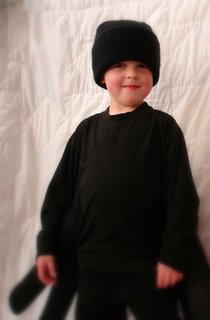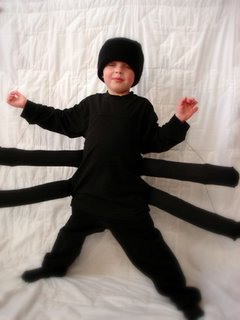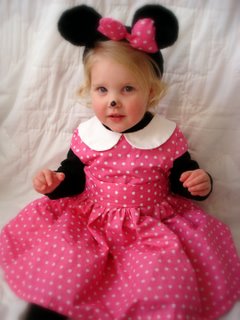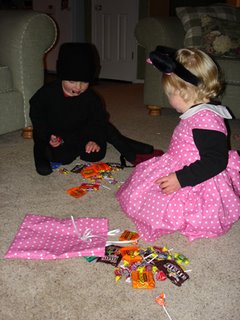Little Boy: Jesus made us, Dad. I want to write a letter to Jesus and say thank you for making us.
Dad: You don't have to write him a letter. You can just thank-you in your prayers.
Little Boy: I love Little Sister. Jesus made her. I want to write a letter to Jesus. It will say 'Dear Jesus, thanks for building us.'
background
Monday, November 27, 2006
Wednesday, November 15, 2006
sibling matters
Hello out there? Anybody still around? I have no explanation for my absence other than I didn't have anything to say. Okay, I take that back. I had plenty of things to say, but couldn't figure out how to say them. Plus, it's all boring philosophical junk. Here's just one thing that has been on my mind...
Ever since Little Sister was born, I have been interested in sibling relationships. More specifically, how to help my kids have a good one and keep the rivalry to a minimum. I recently came across a great article in BYU Magazine called Brothers in Deviance explaining the influence that older siblings can have on younger ones. The opening paragraph caught my interest immediately:
Gulp. I've caught myself thinking "that's just what big brothers do" when Little Boy picks on Little Sister. I've also caught myself thinking "that's just what little sisters do" when Little Sister takes Little Boy's lego that he was reaching for and runs away. I've cut myself too much slack and probably should have done more to intervene and teach them the correct way to interact. I was hooked from there and thought the following information was so important:
Ever since Little Sister was born, I have been interested in sibling relationships. More specifically, how to help my kids have a good one and keep the rivalry to a minimum. I recently came across a great article in BYU Magazine called Brothers in Deviance explaining the influence that older siblings can have on younger ones. The opening paragraph caught my interest immediately:
The old adage that boys will be boys should be retired, according to BYU researcher Bert O. Burraston (BS ’91). It cuts parents too much slack when their boys bully younger siblings. Recent studies have shown that such bullying significantly increases the likelihood that younger siblings, particularly boys, will become bullies themselves—or worse.
Gulp. I've caught myself thinking "that's just what big brothers do" when Little Boy picks on Little Sister. I've also caught myself thinking "that's just what little sisters do" when Little Sister takes Little Boy's lego that he was reaching for and runs away. I've cut myself too much slack and probably should have done more to intervene and teach them the correct way to interact. I was hooked from there and thought the following information was so important:
Burraston’s findings are based on his recently published 11-year study of 105 boys at risk of delinquency. Although Burraston and his research partners acknowledge that a child’s behavior is shaped by a host of factors, having an older delinquent brother was a disproportionately strong indicator of delinquency. Using complex statistical modeling, the researchers showed that the delinquent older sibling passes on his behavior via two main ways—fighting with younger siblings and bringing deviant friends home. Children who experienced these factors were 25 percent more likely to engage in such behaviors as physical violence, criminal activity, drug and alcohol use, and sexual activity.
Fighting, or what researchers call “sibling conflict,” includes physical conflict, yelling, nagging, and stealing a sibling’s belongings. Burraston and his colleagues found that when an older sibling was in grade school, the more he fought with a younger sibling, the more likely both siblings were to become delinquents in adolescence.
But don’t all brothers and sisters, but especially brothers, yell at each other and deliver at least an occasional jab? Yes, says Burraston, and parents should be concerned. While eliminating all conflict isn’t realistic, parents should take steps to reduce it as much as possible. Parents need to teach their children to resolve conflict without violence or intimidation. “The more the children fought with one another, the more apt they were when they were older to do deviant things when they hung out together.”
Double Gulp. I've always known that I felt it was important for my kids to get along. I wanted our home to be a place where they fit in, feel loved, and don't feel threatened. If they are fighting and picking on each other that can hardly feel like a happy and safe place to be.
The article goes on to explain some ineffective parenting techniques along with some effective ones. Let's just say I'm guilty of nattering and trying to mend my nattering ways. You must read the article to figure out what that means!
Sibling conflict is basically a form of antisocial behavior, says Burraston, and the antidote is pro-social skills. So rather than nagging at kids when they quarrel, parents need to give their kids tools for handling conflict.
That's something I never would have thought of: Sibling Conflict=Antisocial Behavior. I have to admit that is a good motivator for me to help my kids learn the tools for handling conflict with each other.
Burraston likes to remind LDS parents how serious this parental responsibility is by quoting King Benjamin’s sermon in the Book of Mormon: “And ye will not suffer your children that they . . . fight and quarrel one with another. . . . But ye will teach them to walk in the ways of truth and soberness; ye will teach them to love one another, and to serve one another” (Mosiah 4:14–15).
This is not a new problem. There has been sibling conflict since the beginning of man (think Cain & Abel). It was obviously a big enough problem that King Benjamin felt it necessary to address his people about it. I just hope that I can be a parent who gets it right and can teach them to truly love one another and to serve one another.
Wednesday, November 01, 2006
Subscribe to:
Posts (Atom)







